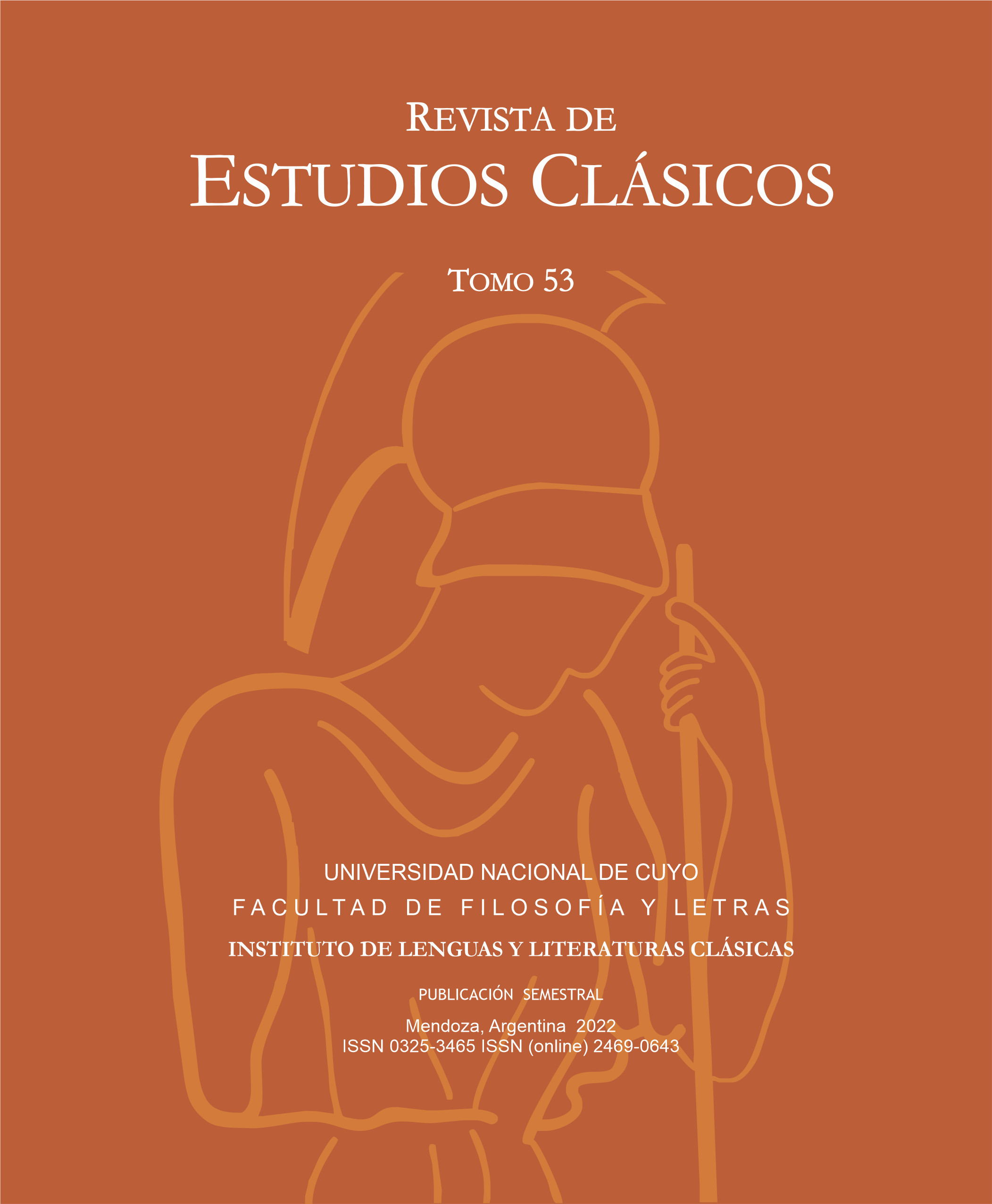The Male Scortum in Latin Historiography
Homosexuality and Luxuria in a Corpus of Moralizing Historical Narratives
Keywords:
Curtius Rufus, homosexuality in Rome, Livy, scortum, Trogus-JustinAbstract
This paper analyzes three passages from three Latin historians (Livy, Trogus-Justin and Curtius Rufus) that feature male scorta. With the help of gender studies and narratology, this study will examine the role that each of these characters play in their respective narratives.
References
Adam, A.-M. (2003). Tite-Live. Histoire romaine. 29: Livre 39. Paris: Les Belles Lettres.
Adams, J. N. (1982). The Latin Sexual Vocabulary. London: Duckworth.
Adams, J. N. (1983). Words for ‘Prostitute’ in Latin. Rheinisches Museum für Philologie, 321-358.
Atkinson, J. E., y Yardley, J. (Eds.). (2009). Histories of Alexander the Great. Book 10. Oxford; New York: Oxford University Press.
Badian, E. (1958). The Eunuch Bagoas. The Classical Quarterly, 8 (3/4), 144-157.
Bergua Cavero, J., Bueno Morillo, S., y Guzmán Hermida, J. M. (2007). Plutarco. Vidas Paralelas. VI. Alejandro—César. Agesilao—Pompeyo. Sertorio—Eumenes. Madrid: Gredos.
Castro Sánchez, J. (1995). Justino. Epítome de las ‘Historias filípicas’ de Pompeyo Trogo. Prólogos. Pompeyo Trogo. Fragmentos. Madrid: Gredos.
Dauge, Y. A. (1981). Le barbare. Recherches sur la conception romaine de la barbarie et de la civilisation. Bruxelles: Latomus.
González-Haba, M. (2002). Plauto. Comedias III. Madrid: Gredos.
Heckel, W. (2006). Who’s Who in the Age of Alexander the Great: Prosopography of Alexander’s Empire. Malden; Oxford: Blackwell Publishers.
Levene, D. S. (2007). Roman Historiography in the Late Republic. En J. Marincola (Ed.), A Companion to Greek and Roman Historiography (pp. 275-289). Malden; Oxford: Blackwell Publishers.
Ogden, D. (2009). Alexander’s Sex Life. En W. Heckel y L. A. Tritle (Eds.), Alexander the Great: A New History (pp. 203-217). Chichester; Malden: Wiley-Blackwell.
Pejenaute Rubio, F. (1986). Quinto Curcio Rufo. Historia de Alejandro Magno. Madrid: Gredos.
Spencer, D. (2002). The Roman Alexander: Reading a Cultural Myth. Exeter: University of Exeter Press.
Villar Vidal, J. A. (1993). Tito Livio. Historia de Roma desde su fundación. Libros XXXVI-XL. Madrid: Gredos.
Walsh, P. G. (1994). Livy. Book XXXIX. Edited with an Introduction, Translation and Commentary. Warminster, England: Aris & Phillips Ltd.
Williams, C. A. (2010). Roman Homosexuality. Oxford; New York: Oxford University Press.
Wiseman, T. P. (1993). Lying Historians: Seven Types of Mendacity. En C. Gill y T. P. Wiseman, (Eds.), Lies and Fiction in the Ancient World (pp. 122-146). Exeter: University of Exeter Press.
Downloads
Published
How to Cite
Issue
Section
License
LicenseAquellos autores/as que tengan publicaciones con esta revista, aceptan los términos siguientes:
- Los autores/as conservarán sus derechos de autor y garantizarán a la revista el derecho de primera publicación de su obra, el cuál estará simultáneamente sujeto a laLicencia Creative Commons Atribución-NoComercial-CompartirIgual 2.5 Argentina (CC BY-NC-SA 2.5 AR). (https://creativecommons.org/licenses/by-nc-sa/2.5/ar/)que permite a terceros compartir la obra siempre que se indique su autor y su primera publicación esta revista.
- Los autores/as podrán adoptar otros acuerdos de licencia no exclusiva de distribución de la versión de la obra publicada (p. ej.: depositarla en un archivo telemático institucional o publicarla en un volumen monográfico) siempre que se indique la publicación inicial en esta revista.
- Se permite y recomienda a los autores/as difundir su obra a través de Internet (p. ej.: en archivos telemáticos institucionales o en su página web) antes y durante el proceso de envío, lo cual puede producir intercambios interesantes y aumentar las citas de la obra publicada. (Véase El efecto del acceso abierto).












